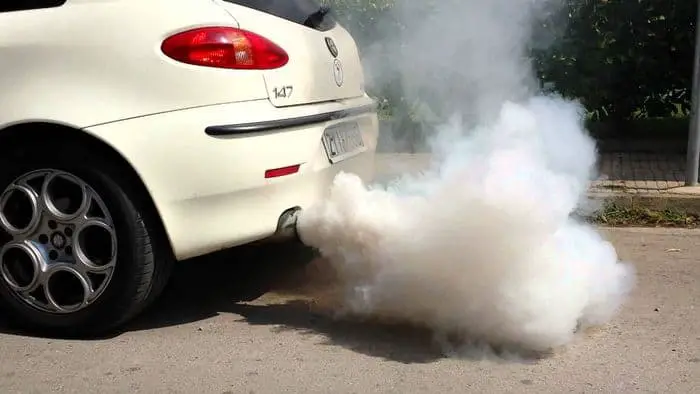We recently wrote an article about the 7E8 engine error code. Problems with your card can be much more complicated and dangerous.
Smoke emanating from a car indicates a problem. It might be a small problem, but something is likely wrong with your vehicle.

It’s normal to observe a little puff of plumes of smoke emerging from your exhaust when you start your automobile after sitting overnight – it’s just water vapor. Likewise, on a wet day, steam rises from beneath the hood as the water burns off the radiator or exhaust. However, if you’re moving and observing smoke rising from the engine or exhaust, don’t worry. Recognizing what the smoke’s appearance (or smell) implies will help you identify the source and decide whether to pull over instantly or continue driving to a repair shop.
Why Is My Car Smoking?
Faulty wire casings, overheated liquids, or heated residues on the engine block can cause car smoking. However, the most common smoke cause of smoke is when oil, transmission fluid, or brake fluid spills. For example, you will see smoke when oil leaks from a bad gasket or seals onto a hot engine or the exhaust system.
Small amounts of motor oil or other fluids accidentally spilled or seeping from a defective gasket or sealed onto a hot engine or the exhaust system are the most typical causes of smoke under the hood. Other liquids may include engine coolant, power steering fluid, brake and transmission fluid, and even window washer solvent. This vapor is usually harmless, but it must be dealt with as rapidly as possible.
A plume of smoke erupting from the exhaust or behind the hood, on the other hand, generally indicates a catastrophic mechanical or electrical problem.
What does white smoke from exhaust mean?
White smoke from the exhaust can be caused by:
- Condensation in the exhaust pipe
- Head gasket failure
- Engine coolant leak
Usually, white smoke from the exhaust is caused by a cracked or leaking head gasket. Sometimes, you must replace your head gasket to fix this problem. However, usually, it is enough to repair treatment to seal the leak.
Almost all cars have white smoke immediately after starting the engine during colder winter days. However, this smoke is not a cause for concern because it is condensate evaporation. When hot exhaust gases come into contact with condensed water in the exhaust system, evaporation usually disappears when the engine warms up.
Suppose the white smoke continues to come out even after the engine has been running for a while or during the warmer part of the year. In that case, we can say that this was when the coolant entered the combustion chamber, especially if the smoke smelled sweet. Exhaust smoke usually happens when the cylinder head gasket burns out or the cylinder is damaged, and a minimal amount of coolant in the fuel/air mixture is enough for the smoke to appear.
One of the symptoms accompanying the appearance of white smoke is the lack of coolant in the system and greasy liquid or oil deposits, which you can check by unscrewing the cap of the antifreeze tank (continually when the engine cools down).
Can too much oil cause white smoke from exhaust?
No, low or high fluid levels should not produce white smoke. However, if you overfill the engine and oil leaks somewhere, you can see white smoke with a blue or grey tint. When oil enters the combustion chamber, you will see smoke from your exhaust.
What does blue smoke from exhaust mean?
Blue smoke means that the engine is burning a lot of oil. This problem is usually caused by worn engine components like piston rings, Positive Crankcase Ventilation valves, or valve seals.
To get rid of blue smoke from the exhaust and fix the problem permanently, you will need to do one or more steps:
- Remove Excess Oil
- Clean Engine.
- Replace PCV Valve.
- Replace Piston Rings.
- Repair Valve Seals.
- Fix Turbocharger.
Blue or blue-gray smoke from the exhaust is the worst symptom, as it is an almost sure sign that the engine is burning engine oil. The most common culprit for this problem is worn piston rings, i.e., links, which are one of the most loaded parts of the engine because they have the task of maintaining proper compression and cleaning the cylinder walls of engine oil. However, our cars usually have high mileage; the links are no longer as elastic as they were like new, and they cannot wholly remove excess engine oil, so they stay in the chamber and burn together with the fuel and air mixture.
This causes the engine to not work correctly because the mixture is contaminated with oil. As a result, the engine achieves optimal power; the engine electronics inject more fuel, which increases fuel consumption. The mileage at which critical link wear will occur depends on several factors, such as engine operating conditions because short-distance engines are more stressed, maintenance and regular oil changes, engine overheating, etc.
What does black smoke from exhaust mean?
Black smoke from exhaust means that your car uses an overly rich fuel mixture. The air-fuel variety is too broad because either leaking injectors do not work correctly or your engine management system causes it to supply too much fuel. Sometimes, defective fuel pressure regulator causes black smoke, too.
This is not a very serious problem; it can usually be fixed easily.
Diagnosing and solving this problem is a bit simpler because the problem is somewhere in the fuel injection system. Hence, it is necessary to check the operation of common-rail systems, fuel pumps, and nozzles, as well as adding filters, sensors, etc., but the cause may be poor fuel quality. For example, black smoke is also a symptom of EGR valve failure. There is a possibility that the engine loses air due to a cracked intake hose or dirty air filter, and if these faults are not resolved in time, they can cause related problems with MAF sensor, turbine, DPF filter clogging, etc.
What Should I Do If My Car Starts Smoking?
Pull over and check to see whether your vehicle is safe to drive—use good judgment and err on the side of caution. Examine the gauges and warning lights to see whether the engine is overheated, the oil light is on, the oil level is reduced, or the Warning light is illuminated.
Perform a rapid visual examination. You may have run over a burning plastic bag on the catalytic converter. Never work on or touch a hot engine. Check the fluids when the engine has cooled down. If you notice fluids flowing or puddles accumulating beneath the hood or on the ground, it’s time to contact a tow truck. If your car runs out of coolant, transmission fluid, or engine oil, it will suffer severe damage that will necessitate major (and costly!) repairs.
